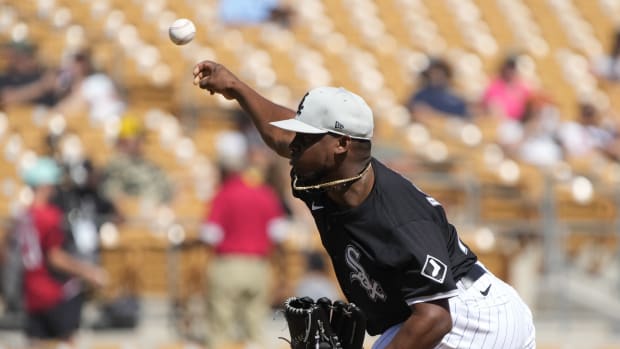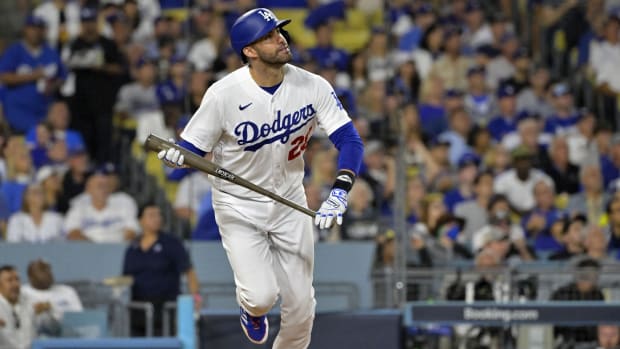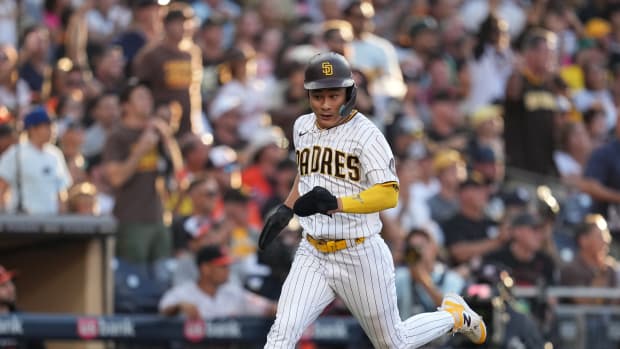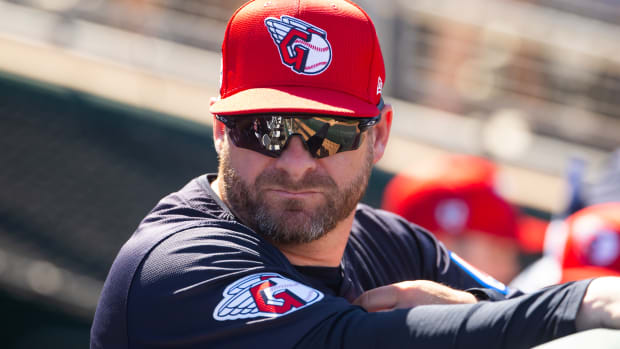Craig Kimbrel's Control, Clayton Kershaw's Future Among Biggest Questions Entering World Series
With the World Series beginning on Tuesday, SI's Ben Reiter identifies the biggest questions entering one of the most enticing World Series of the decade.
1. Manny Machado: Hero or villain?
We know how the Red Sox feel about their former A.L. East rival; Tom Verducci dug into their longstanding animus for him on Sunday. Machado hasn’t helped his broader reputation by admitting that he often chooses not to hustle, and by intentionally running over the heel of Brewers’ first baseman Jesus Aguilar during the NLCS, resulting in a $10,000 fine. The shortstop almost certainly has a maximum of seven games left in his Dodgers’ career—they’re extremely unlikely to offer him what might approach a record free agent contract, not with Corey Seager returning next year and Justin Turner entrenched at third—and this is Machado’s chance to reverse the narratives that now swirl around him, and perhaps recoup at least a few million dollars that his antics might prove to cost him this winter. He’ll also have to turn around a mini-slump to be fondly remembered in Los Angeles: over the last four games of the NLCS, all of them hitting cleanup, he had just three singles in 18 at-bats and failed to drive in a run.
2. How much will Mookie Betts play second base?
Will Red Sox skipper Alex Cora really screw around with his best player? He will—and he should. With no D.H. slot available in the three games in L.A., J.D. Martinez is certain to play rightfield, leaving two outfield openings for three players: Betts, Jackie Bradley Jr., and Andrew Benintendi, the latter two of whom are lefthanded hitters. Cora’s best lineup features all three of them, meaning that Betts, drafted as a middle infielder, will likely have to man second base—at least against Walker Buehler, a righty. In fact, it wouldn’t be at all surprising to see Betts spend at least some time at second in each West Coast game.
3. Is this the last we’ll see of Clayton Kershaw in Dodger blue?
The assumption is that Kershaw will opt out of the two years and $65 million he has left on his contract, and then that the Dodgers will re-sign him. But that’s not a certainty, especially given the 30-year-old’s declining velocity (down to an average of 91 mph this year) and 25 missed starts over the past three seasons, as well as the Dodgers’ focus on spending their monstrous payroll judiciously. In fact, since Andrew Friedman and Farhan Zaidi took over as, respectively, team president and G.M. in 2014, L.A. hasn’t doled out a free agent deal larger than Kenley Jansen’s $80 million over five years. Recall that the two declined to match the Diamondbacks’ six-year, $206.5 million offer to Zack Greinke two winters ago. Might a Dodgers’ victory serve as a psychological capstone to Kershaw’s brilliant eleven years in Los Angeles, and make his return less likely?
4. Has Craig Kimbrel’s control returned?
The old Kimbrel seemed to return in Game 5 of the ALCS. He closed out the Astros with a hitless ninth inning, striking out two. But that performance lowered his postseason ERA to 7.11, and in October he’s walked six batters in just 6.1 innings. In fact, he’s thrown strikes with just 57% of his pitches—65 of 115. During the regular season, just two pitchers – the Angels’ Justin Anderson and the Cubs’ Tyler Chatwood – who worked more than 40 innings were wilder. It’s unlikely that even a hurler of Kimbrel’s repute will be able to continue to successfully navigate that tightrope.
5. Will Dave Roberts survive a second straight World Series loss with his job?
The Dodgers spent just under $200 million on player salaries this year. They are built to win their first World Series in three decades. At least some of the blame for their failure to break that streak last year fell on their skipper—specifically as far as his decisions related to his pitchers. Against the Astros, he yanked the cruising Game 2 starter Rich Hill after just four innings and 60 pitches (the bullpen yielded six runs; the Dodgers lost), then left a struggling Yu Darvish in to face a red-hot George Springer in the second inning of Game 7 (Springer hit a three-run homer; and the Dodgers lost). So Roberts will be managing under a microscope, and against facing the No. 1 offense in the league.
The book suggests that the Red Sox fare worse against lefties—they had a major-best OPS of .817 OPS against righthanded pitchers, and a 19th-ranked .719 OPS versus lefthanders— and Roberts’ pitching staff should feature a half-dozen of them, including three in the bullpen. But Boston has reversed those splits this October, with a .791 OPS against lefties and a .730 against righties. If the Dodgers lose, it might be unfair to censure Roberts for failing to pull the right strings against an offense like the Red Sox’; perhaps there will have been no right strings, and the Dodgers’ front office does prioritize process over outcome. But outcomes matter, too.



































